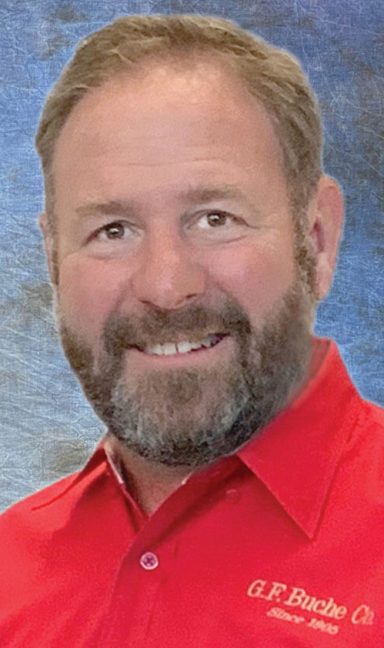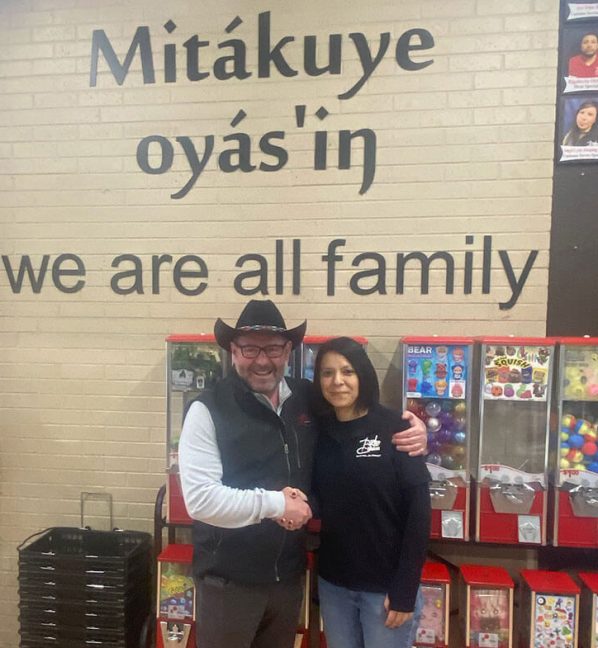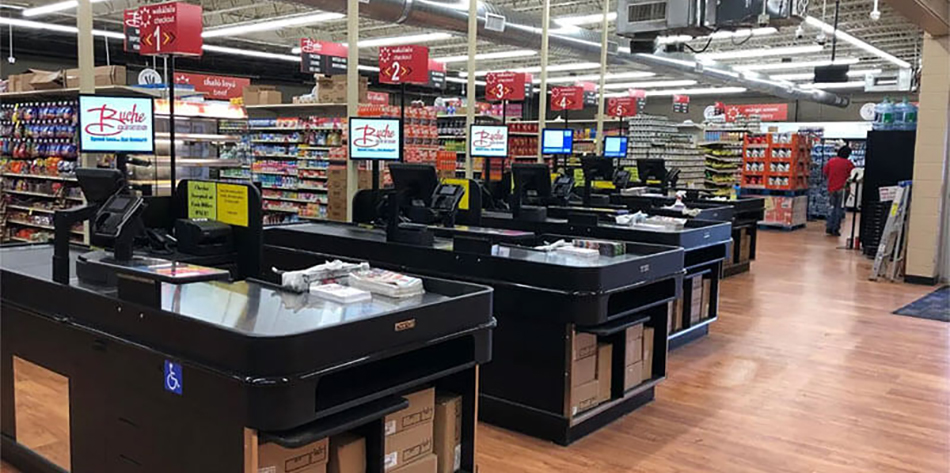Fourth-generation South Dakota grocer RF Buche has a passion for retail but an even greater passion for helping people. That sentiment stems from a lesson he learned at age 7 from his father.
While helping out in the store, he saw his dad quietly slip some cash to a mother in the checkout line who didn’t have enough to pay for her groceries.

When Buche later asked why he did that, he said his father told him, “RF, when you’re in this business, it is your moral obligation to make sure no one goes hungry.”
Buche said he has never forgotten that lesson. “I love to win. I love to make money, but it is just a vehicle to be able to do things like my dad did,” he said.
Buche added that always doing the right thing is one of the core values of the GF Buche Co., named after his great-grandfather. “I don’t look at this as an investment. This is just a vehicle to be able to do what I like to do, which is helping people and feeding people,” he said.
This guiding principle is evident as the company expands its footprint while deepening its long-standing commitment to the communities it serves, particularly the Native American tribes in South Dakota, and advocates for independent retailers.
Expansion
On the recent acquisition of Paylessfoods in Mobridge, South Dakota, Buche said that a long-standing relationship with its owner, Josh Stoick, paved the way.
“He knew that we were looking to expand, and I think the timing was just right for him,” Buche said. “We obviously are always looking to expand, especially in areas that we think that we’re a good fit. And when touring that town and touring that store, it just felt like home.
“We believe it was a good fit for us. We believe it increases our buying power, and that will help bring lower prices to our customers as well.”
Furthering its commitment within South Dakota, Buche Foods is partnering with the Lower Brule Sioux Tribe to establish a new retail space in the Lower Brule community, which is about 28 miles northwest of Oacoma.
“They’re putting in a brand new 12,000-square-foot grocery/convenience store. This will be our second one in that format. Our convenience stores are called Gus Stops, after my great-grandfather, Gus Buche.”
[RELATED: Feeding The Community An Obligation For Buche Foods]
While the arrangement is primarily a lease, Buche emphasized the collaborative nature of the relationships with tribal entities.
“For the most part, we are leasing, but I would consider it a partnership. And we pride ourselves in having long-lasting relationships with our tribal reservations, and that’s where we probably feel most at home. Actually, all of our stores are either on or near reservations – 24 stores, all in South Dakota.”
Buche’s deep personal connection to the Native American communities the company serves is evident in his words and actions.
“My friend Darla Black said one time how generous I was and how good my heart was. And she said, ‘I think he was just born the wrong color.’ And I found that to be one of the greatest compliments I’ve ever had.”
This sentiment fuels the company’s mission to address the significant challenges faced by reservation communities.
“I just have it in my heart for Native Americans in these reservations. I know the struggles that are out there,” said Buche, citing reservations that have 80 percent unemployment and 80-90 percent without cars.
“The diabetes complications are three to four times higher than anywhere in the United States. The infant mortality rate is five times the average … and nearly one in three people live in food insecurity. And it just is very important for me and our mission to make sure that we do everything we can to help in some of those areas.”

A recent milestone that exemplifies this commitment is the appointment of a Lakota woman, Tameka Vocu, as the store manager of the Pine Ridge location. Recalling the tribal council’s reaction, Buche said they were “ecstatic” about it.
“When we were negotiating our lease … one of the conditions they wanted was a tribal member as a manager of that grocery store. And I just said, I’m not going to do that. I’m going to promise you that I do not care what color of skin they are – white, brown, black, pink, purple. It doesn’t matter to me. I’m going to hire the best manager there is.
“And when our [previous] manager, who was non-native, decided that it was time for him to step back, it was a very easy decision. I was very excited to go back and tell the council, she’s getting this because she earned it. It didn’t require you to put a stipulation on me to do so.
“I’m going to put the best person in there, and I hope to heck that it’s an enrolled member of the Oglala Sioux Tribe. And it is. It was a great milestone. She’s doing a remarkable job.”
He noted the company also has an ACE hardware in that location, as well as an auto parts store. “And I’m proud to say that those two [managers] are both enrolled members [of the tribe] as well.”
While Buche doesn’t track specific demographic data, he estimates a significant portion of the company’s workforce is Native American.
“I would be surprised if we weren’t over 50 percent Native Americans. I don’t really have those numbers, and it’s not that anything that I really pay attention to. At the end of the day, we’re going to hire the best person for the job.
‘I can hope that they’re Native American, but we’ve got to run the store, and we’ve got to take care of our customers. And whoever can best do that, that’s what we want to do.”
Buche also highlighted the significant role his company plays in the local economies. In Pine Ridge, for example, he said other than the hospital and the tribe, Buche Foods is probably the next largest employer.
“And I would say outside of the hospital, we probably have the best benefits and pay the best that there is.”
To address transportation challenges in remote communities, Buche Foods has piloted innovative solutions like food lockers in the Marty community on the Yankton Sioux reservation.
People in the community can go online and place their orders, which are then delivered to the food lockers in the tribal community building.
“I think it’s too early to tell whether we’re going to do that in other communities. I think that it makes sense in some of those areas, when you’ve got people that don’t have vehicles, and they cannot afford to pay somebody $20 or $25 just for a ride to town. We wanted to get some food lockers close to our home base and see if they’ll get used.”
The initial response has been positive: “It’s been very good. They are very excited about it,” Buche said.
Challenges for independents
Addressing the significant challenges facing independent retailers, both in South Dakota and across the nation, Buche said the biggest obstacle is the unfairness in supplier pricing.
“I think it is extremely unjust what is happening to us independents today,” he said. “Currently, four companies control 69 percent of the market share of the grocery business, and they are forcing their suppliers to sell those items below cost.”
He advocated for fair competition, referencing the Robinson-Patman Act.
“In 1936, there was a Robinson-Patman Act passed where it said that all prices must be fair,” he said. “Now, if we can agree that there is no greater efficiency than a truckload of groceries, if my wholesaler’s truck pulls up to General Mills to buy a semi full of Cheerios and Walmart’s [semi] does the same thing, those prices are not equal. And that’s not fair, and it’s not right.”
Buche emphasized the detrimental impact on rural communities.
“My customers live 60-70 miles from the closest Walmart. It isn’t fair that they should have to pay 10, 20, 30, sometimes up to 50 percent more for their groceries just because they don’t live next door to Walmart. It’s not right. It really bothers me for our customers.”
He also expressed concern about the rise of dollar stores and the potential disappearance of independent grocers, highlighting their crucial role in community support.
“Us grocers are the backbone of the community. You’re starting to see a lot of towns, 1,000 people and less – and even in other states bigger than that – where those grocery stores are going away.
“That scares me, not just for the people that have to drive for their groceries, not just because they’re going to have to buy processed foods at Dollar General, but who’s going to keep that community alive?”
[RELATED: NGA Warns FTC: Protect Competition, Supply Chains Amid Tariff Pressures]
Buche expressed diminished optimism regarding the enforcement of fair-trade practices due to the current administration.
“I [had hope about enforcement of Robinson-Patman Act] until about a month ago, when Trump fired two Democratic Federal Trade Commissioners. What I do worry about is who’s fighting for us now to get to a level playing field?”
He believes independent grocers are inherently efficient and could thrive on a level playing field.
“Independents are way more efficient. We’re broader thinkers. We know how to get things done in our communities,” he said. “If we were playing on a level playing field, it would be amazing. So I’m not as optimistic as I once was.”
Buche stressed the urgent need for independent retailers to engage with their elected officials.
“I think it’s not only important for local grocers. I think it’s for all retailers, to be honest, and I think they should be reaching out to not only the national level but the state level,” he said. “To me, our attorney generals ought to be getting involved in this. I just don’t understand why they’re not.”
He also emphasized the importance of community involvement.
“I think it’s important for our customers to get engaged. I think it’s important that the chamber of commerce, economic development [agencies] in these small towns, our customers, tribal entities, everybody really needs to get involved. Because this is getting worse.”
Buche added that store tours for legislators can be a valuable tool for education and highlighted the role of the National Grocers Association in guiding these interactions.
“I think [store tours] can be effective, especially under the direction of NGA. They’re very helpful at giving you the points that need to be talked about,” he said. “I think us grocers are excellent in our field, but we also maybe don’t understand the underlying things that need to be brought to the attention of these officials. Just like I’ve never been in politics before, those guys have never run a grocery store before.”
Looking ahead, Buche emphasized the growing importance of Buche Foods’ nonprofit arm, Team Buche Cares.
“We have been doing some fundraising, some benefits. Our last benefit, we raised enough money where we could give turkey to 100,000 people across South Dakota through 121 communities and covering all nine reservations. We did it in four days and for under $2 a person.”
Remaining true to the early lesson from his father, Buche’s focus is increasingly turning toward community support.
“I’m very passionate about retail, and I’m very passionate about our stores. I’m very passionate about helping those who need the help,” he said. “So even though we’re staying active on the retail side, and we want to grow, I’m working very hard on the nonprofit side to help in those areas that need help the most, especially in light of a lot of government cuts being made.
“People who are less fortunate now have less options, so it’s even more important for us to get involved and make sure that they don’t go hungry.”

